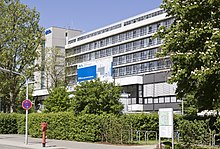German Cancer Research Center
You can help expand this article with text translated from the corresponding article in German. (May 2019) Click [show] for important translation instructions.
|
This article needs additional citations for verification. (February 2021) |

The German Cancer Research Center (known as the Deutsches Krebsforschungszentrum or simply DKFZ in

History
The establishment of a national cancer research center in Germany was initiated by Heidelberg surgeon
Two scientists to date that were affiliated with the DKFZ have received Nobel Prizes. The first was Harald zur Hausen who won the 2008 Nobel Prize in Medicine for his work in the discovery of the human papillomavirus, which causes cervical cancer.[3] The second was Stefan Hell, who won the Nobel Prize in Chemistry for his pioneering work in the field of ultra high resolution fluorescence microscopy.[4]
Research
Cancer research at DKFZ is structured in six Research Programs (as of 2022)[5]
- Cell Biology and Tumor Biology
- Functional and Structural Genomics
- Cancer Risk Factors and Prevention
- Immunology and Cancer
- Imaging and Radiooncology
- Infection, Inflammation and Cancer
DKFZ maintains an interdisciplinary structured graduate school known as the Helmholtz International Graduate School for Cancer Research. This school offers an in-house international M.Sc. program in "Molecular Biosciences" with a major in "Cancer Biology". As well as international Ph.D. and Postdoc programs.[6][7][8]
Cooperation with other partners
A result of the successful cooperation of the German Cancer Research Center with other partners is the first new building for "The National Center for Tumor Diseases" (NCT) in Heidelberg. The project was commissioned by the
The German Cancer Consortium (DKTK) is a joint long-term initiative involving the German Federal Ministry of Education and Research (BMBF), participating in German states and the German Cancer Research Center (DKFZ). It was established as one of six German Health Research Centers (DZGs) in October 2012. More than 950 researchers work within the DKTK, along with support staff. Around 350 of them are employed via the DKFZ. An important task of the DKTK is promoting the next generation of researchers in the field of translational cancer research. For this reason, around 20 percent of all DKTK employees are postgraduate students. The DKTK is financed via an institutional funding model. Since 2014, the DKTK’s annual budget has been EUR 27.8 million (90/10 financing). The total budget for the first research period (2012–2015) was EUR 80.5 million.[9]
References
- ^ "History of the Helmholtz Association". Helmholtz-Gemeinschaft Deutscher Forschungszentren. Retrieved 2022-07-12.
- ^ "Quick Facts - Deutsches Krebsforschungszentrum". www.dkfz.de. Retrieved 2022-07-12.
- ^ "Nobelprice in Medicine 2008". www.dkfz.de.
- ^ "Nobel Prize in Chemistry 2014". www.dkfz.de.
- ^ "Deutsches Krebsforschungszentrum". www.dkfz.de. Retrieved 2022-07-12.
- ^ "In-house Master Program: Major "Cancer Biology" at the German Cancer Research Center". www.dkfz.de. Retrieved 2023-09-06.
- ^ "PhD Program". www.dkfz.de. Retrieved 2023-09-06.
- ^ "DKFZ Postdoc Program Overview". www.dkfz.de. Retrieved 2023-09-06.
- ^ "Facts and Figures :: DKTK". dktk.dkfz.de.
